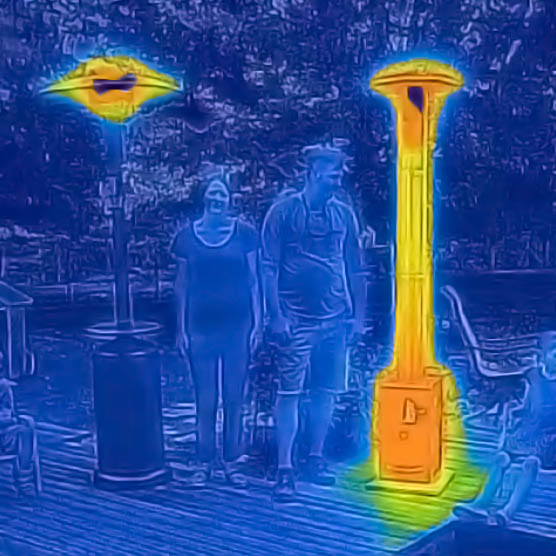Patio Heater Comparison Guide
There are several elements of a patio heater to consider when determining the best fit for your needs. This page will be discussing the heat, heating radius, and cost efficiency of patio heaters that run on four different fuel types: wood pellets, propane, electricity, and natural gas.
Thermal Image Comparison
There’s no better way to determine which patio heater is better than a thermal image. You can see the propane heater only generating heat at the top while the wood pellet heater radiates from the bottom to the top.

| Avg. Heat Output | Operating Cost (based on 40,000 BTU heat output) | |
| propane | 40,000 BTU’s |
$2.00/Hr 10Hrs per 20lb tank |
|
Natural Gas |
40,000 BTU’s |
$.50/Hr |
| Electric | 1,500 Watts = 5,000 BTU’s | $1.40/Hr |
| Wood Pellet | 60,000 – 80,000 BTU’s | $.63/Hr |
Propane
The most common type of patio heater out there. They typically connect to a 20 lb tank and will burn for an average of 8-10 hours before the fuel runs out. Propane patio heaters are the most expensive type to operate but are fairly portable.
Gas
Natural Gas Heaters a great option if you have access to a natural gas line on your patio. They have the lowest operation cost but typically require professional installation. You don’t have to worry about running out of fuel but are limited to where they can be placed.
Electric
Electric heaters are an easy solution to outdoor heating since all they need is an outlet to plug in to. While this makes the fuel convenient, Portability becomes limited by the amount of cord you have and the availability of power. They come in a variety of shapes and sizes from wall mounts to small tabletop heaters. Electric heaters are Eco-Friendly as they do not produce any emissions.
Wood Pellets
Wood Pellets are an eco-friendly alternative fuel source that have an extremely high combustion efficiency. Timber heaters run at roughly half the operating cost vs propane while Producing Twice the amount of BTU’s. Our Heaters provide a campfire like atmosphere with radiant heat and a wood fire to watch. With a gravity fed system and removable stove pipe, Timber heaters require no electricity and are portable.
Using Wood pellets seems to make a lot more sense than propane when discussing outdoor heating options. At half the cost you get twice the amount of heat with one of our wood pellet patio heaters! Not to mention the biggest issue with propane patio heaters, your head might stay warm but the rest of your body is freezing. Our Timber Stoves ability to keep you and your guest warm from head to toe is its biggest advantage.
What Is A Wood Pellet?
A pellet is a fuel type that is created by compressing small biomass particles. They are usually made from wood, but can also be made from agricultural and food waste.
Sawdust is compressed tightly via a pellet mill to shape the pellet to a ¼’’ x ½’’ size.The small size of the fuel allows precision mixtures of air to fuel. This is why people love a pellet stove. They can literally set it to a temp and let it go. The density of pellet fuel is ultimately a major factor in the ability to get high BTU output from a waste product that otherwise would not burn well.
A compact fuel typically coming in 40 lb bags that can move from one location to another. Stores for about 1 year under dry storage. Most all hardware stores stock wood pellets all year. This convenience allows Timber Stove owners to stop by a local store to pickup fuel usually just minutes from home.

